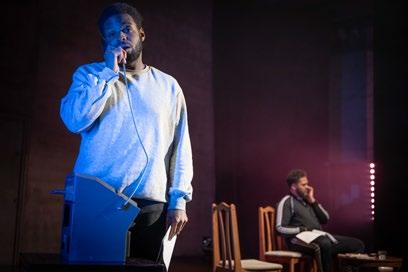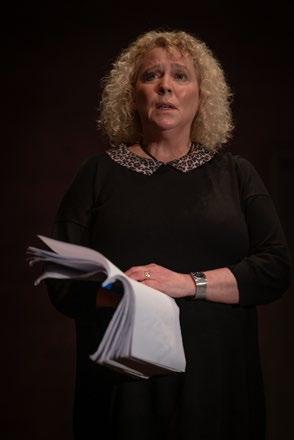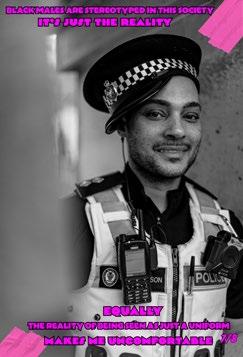REIMAGINING POLICING THROUGH THE ARTS




Professor Jacqueline Hodgson and Dr Rachel Lewis, University of Warwick






Professor Jacqueline Hodgson and Dr Rachel Lewis, University of Warwick

Since 2021, we have been researching police-community engagement through arts and culture. We began by investigating the West Midlands Police partnership with the Coventry UK City of Culture, and we’ve gone on to develop a broader body of research on the subject.
In the context of very low levels of public trust in the police, we ask three key questions:
What happens when police and communities engage in creative initiatives together?
What impacts might creative initiatives have on police practice?
How might artistic initiatives offer space for reimagining the role of policing?
We see many complexities and challenges in police-community engagement through the arts, for instance around the ethics of this form of encounter. However, we also find that arts initiatives can open up interesting possibilities for more
collaborative dialogue between police and communities. In turn, this can begin to challenge current police practice. Creative projects can also offer space both for communities and for police to begin to rethink the role and function of the police, and to reimagine the ways in which ‘good’ policing might be enacted.
We wanted to bring this research to a wider audience and also to test it out for ourselves – to see how our own creative collaborations might open up further exploration of the themes in our research. So, we built a partnership with a creative team at the Belgrade Theatre and commissioned Amahra Spence to write a new play – ‘After Preston’ – which draws on the findings in our research.
On December 1st 2023, the play was shared with an invited audience, including pupils from local schools, creative practitioners, community organisations, academics, criminal justice practitioners and police.
Alongside the sharing, audience members also had a chance to view Kay Rufai’s ‘Barriers to Bridges’ exhibition – a series of photographs and video footage
of young people and police, curated during Kay’s artist-in-residency with West Midlands Police in 2021. As part of the day, audience members also took part in breakout sessions and group discussions, sharing their perspectives on the themes presented in the exhibition and in ‘After Preston.’
Nifty Fox were on hand to capture these conversations, and this booklet offers a visual depiction of the day’s discussions, and the ways in which these reinforce, develop, and challenge the broader themes from our research.

The idea of the research –discussions between Warwick, WMP & Coventry City of Culture Trust
First draft of After Preston; feedback & discussion with academic & creative team; we share more detailed extracts from the research; these are fed into Second draft of After Preston
Starting the researchover 100 interviews and focus groups
Meetings with Amahra about research findings & possible themes within the play
NOV 2023
The idea of a play –discussions with Belgrade Theatre
Creative writer – Amahra Spence appointed
Final Research Report Published
Creative director/dramaturg –Jen Davis; Producer –Joe Rose appointed
DEC 2023
Casting of actors for After Preston – Yasmin Dawes, Keiren Hamilton Amos, Corey Weekes, Lara J West. Creative team hold workshops with pupils in 3 local schools using After Preston to begin to explore research themes.
The Play! Staging of After Preston to an audience including pupils, police, academics, creative practitioners, community organisations, City Council members, and criminal justice professionals. Kay Rufai’s exhibition mounted in the Belgrade. Audience members invited to view these images before the play. Pre-show discussions held with the pupils. After-show breakout sessions held with pupils & with other attendees on themes of policing, safety, power, community, and the value of arts & culture in exploring issues around policing. Nifty Fox live illustrates discussions.
Melina and Tremaine’s mum has died in police custody and, throughout the play, Melina grapples with questions around community and care in a society whose institutions – the police, the government, hospitals, social workers – feel hostile and uncaring. We see the characters in the play explore some of the complex themes we found in our research, e.g. how might we understand the role and the function of the police? Are there possibilities for both police and policed to begin to understand one another in more nuanced ways? Can we imagine policing, in the broadest sense of the term, as a practice that supports the safety of all communities? What would have to happen for this to be the case?

Melina, activist & podcaster whose mum died in custody (played by Yasmin Dawes)


Tremaine, Melina’s brother, currently in prison awaiting release following the de-funding of prisons (played by Keiren Hamilton Amos)

Slick, close family friend of Tremaine and Melina since childhood, on good terms with PCSO Nina (played by Corey Weekes)
Aunt Maureen, raised Tremaine and Melina after their mum died in custody (played by Lara J West)
PCSO Nina, a neighbourhood officer who has known Slick since he attended local youth dance events that she helped out with (played by Lara J West)

After Preston Kay Rufai’s Barriers to Bridges Participant workshops and breakout sessions
December 1st 2023
Belgrade Theatre, Coventry

Young people, police, creative practitioners, and the wider audience engaged in workshops to discuss the themes arising in After Preston and in Kay Rufai’s exhibition.
Nifty Fox represented the discussions through live scribing on the day.
Around 30 audience members from community organisations, Coventry City Council, police, the probation service, and creative practitioners shared their thoughts.

A mixture of senior and more junior Coventry-based officers shared their reflections in a separate workshop.

Around 30 young people from 3 local schools took part in workshops and breakout sessions to discuss the themes in our research through the images and characters in Barriers to Bridges and After Preston.

Through discussion and workshops we explored the responses of different audiences to the cultural representations of policing in our play After Preston, and in Kay Rufai’s photographic exhibition Barriers to Bridges. These responses amplified and enriched the findings of our research: our understanding of police-community relationships, of the role and function of the police, and of community perspectives around safety and authority.
Loyalty and respect has to work both ways.
We don’t feel any respect from the police. There’s a new worker on the block every single day […] you can’t build a relationship. It’s good when they take time to get to know us.
Sometimes we’re afraid to speak up. Building relationships with communities builds trust.
The police don’t understand our perspective.

We don’t trust the police.
How do we hand over relationships built when staff move on?
We need to pick the right people for the right place.
We are people first, before police
Almost everyone I know have had awful experiences with the police, and it’s not just a one-time thing, it’s constantly constantly constantly.
The police have only brought harm to people that look like me and people that live in the environments and communities that I’ve grown up in.
We don’t feel any respect from the police.
I understand they’re trying to safeguard, protect the people and everything, but they take advantage of their powers. There are multiple ways to ‘enforce’. They have to pick the right way.
You’ve got to undo 200 years’ worth of damage. You can’t do that with a generation that’s already been damaged by you.
Police officers on the ground are still profiling, are still stereotyping, are still breaking the relationships before they’ve even been built.
The police pick on us and intervene over very minor things.
The police escalate situations.
How do we mop up?
Do we ever apologise?
You can’t just ask a community to trust you and expect that they will.
Personally, I feel we’ve got to do something differently, we’ve got to be a different kind of organisation. We’ve got to demonstrate not just say that we’re a different kind of organisation.

What if we hadn’t done anything and it was a knife and something had happened?
The police should be fighting crime. The police should just back off and give us some more space –they don’t always need to be approaching us when we’re out. The police have helped me when I needed them.
More friendly policing is problematic – it contradicts. Police are needed as a last resort when there’s concern about others. Is the role of the police meant to be an extension of a practice of care?

When I call for help, I’m answered.
Policing should not just be about arresting people.
Policing is about guardianship.
The very direct policing attitude (is) […] to enforce as the caretakers of law, it’s very rigid, it’s very sometimes unfriendly.
Some officers see themselves as arrest machines.
You will have a few officers that perhaps they’ve been ingrained in a certain way of policing […] they’ve joined the job for a specific reason, that may be because they want to detain offenders and that’s their sole thing.
When I see the police I feel scared.
When I see the police I run, I don’t know why. It’s because I’m Black isn’t it? The police don’t keep us safe, they don’t stop crime.
Armed police make us feel unsafe –their presence provokes fear.
Your first impression of them is like oh they’re here for something against us. That’s cos that’s how people see the police now. If there’s police in the house, there’s trouble.
The role of the police is to keep the public safe.
How can we feel safe when historically –were the police made for care, or to coerce through violence?
Safety is not having fear at the front of your mind. Safety means not needing the police in the first place. Safety means not needing guns in the first place. Safety means everyone having what they need.
Safety is about familiar faces, engagement, cultural knowledge. It’s teachable.
Officers often face people who are armed.
The police can be antagonising rather than a safe presence. We need to protect the public and keep them safe.
Police need to act in a way that protects people first and foremost.

The uniform can be a barrier. If I see you in your uniform, I don’t want to talk to you.
The uniform itself is perceived as a weapon. We get judged for what we wear.

People forget that they are people at the end of the day because we see them in their uniform.
It’s incredibly difficult to be caring when you’re carrying that stuff on you.
I’m quite radical in my views –I don’t even know if we ought to have the uniform because it […] breaks down the relationship. You’ve got your helmet on, you’ve got your public order kit on, that engenders a different sort of mentality […] and sometimes what follows is a particular policing tactic.
For a lot of people, it’s very hard to reconcile you as a person with you as your uniform.
Young people also wear ‘uniforms.’
I know that art would make me feel safer around the police. For them to actually get involved in something is really good […] especially arts – in art everyone’s calm.
The police need to change the way they see young people –we’re not all the same.
In the police, there can’t be no emotions but there always has to be that anger emotion – they have to be very strict, firm, fierce. They can’t show their good side.
I don’t think arts and crafts is going to stop gang wars.
It’s about connecting with police men and women as people, and not as their role in the police […] you are connected with the humanity not just their jobs.
I just think arts and culture is a really nice medium to start conversations with communities and different groups of people in different ways.
Art is incredibly deceptively powerful because on the surface it’s just a piece of art but it has the ability to emote and to evoke emotions.
A painting isn’t gonna fix it, a dance workshop isn’t gonna fix […] I think the actions of the police on the ground need to mirror the work that they’re doing.
Using […] arts and culture as a platform has allowed us to at least have conversations and start the ball rolling.
Some people go ‘what do you mean arts and culture? We’re the police, we don’t do that.’
Art can be a lot more powerful […] it’s not data, it’s not stats. And when we’re talking about generating empathy and understanding, this is proving to be a really powerful way of doing that.
We haven’t got enough staff to go to robberies in progress and shootings, so to then expect them to go and decorate a police station window…’


This project continues with Keeping us Safe? –continuing our partnership with the Belgrade Theatre and working with two local schools; and with West Midlands Police through the Police Race Action Plan. Find out more here.
Amahra Spence: creative writer
Jen Davis: director/dramaturg
Joe Rose: producer
Yasmin Dawes: played Melina
Keiren Hamilton Amos: played Tremaine
Corey Weekes: played Slick
Lara J West: played Aunt Maureen/PCSO Nina
Kayode Gomez: sound designer
Arnim Friess: lighting designer and operator
Tracy Croft: stage manager
Rob Wimperis: technical manager
Nicole Young: photographer
